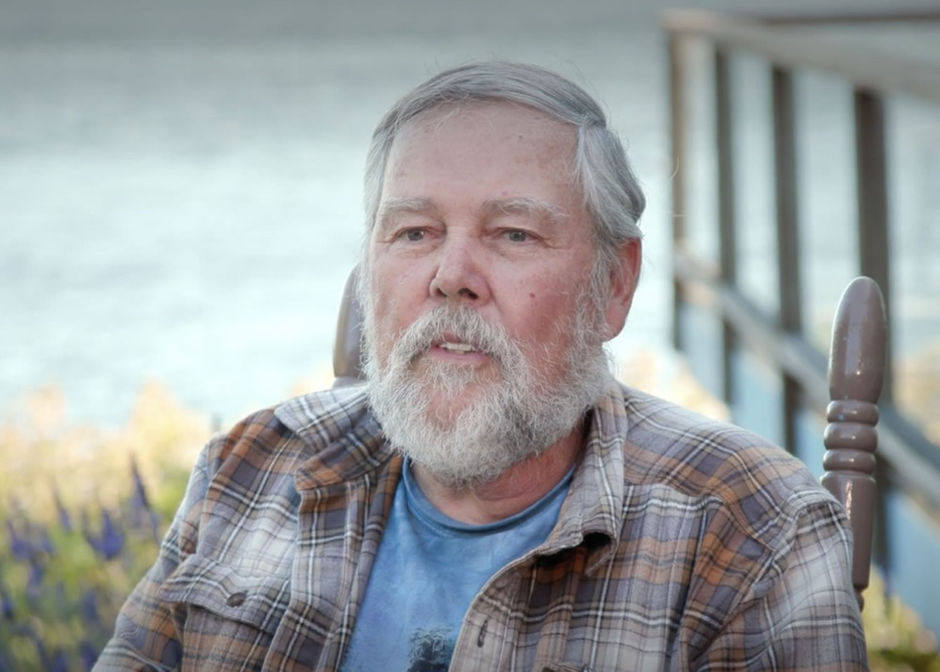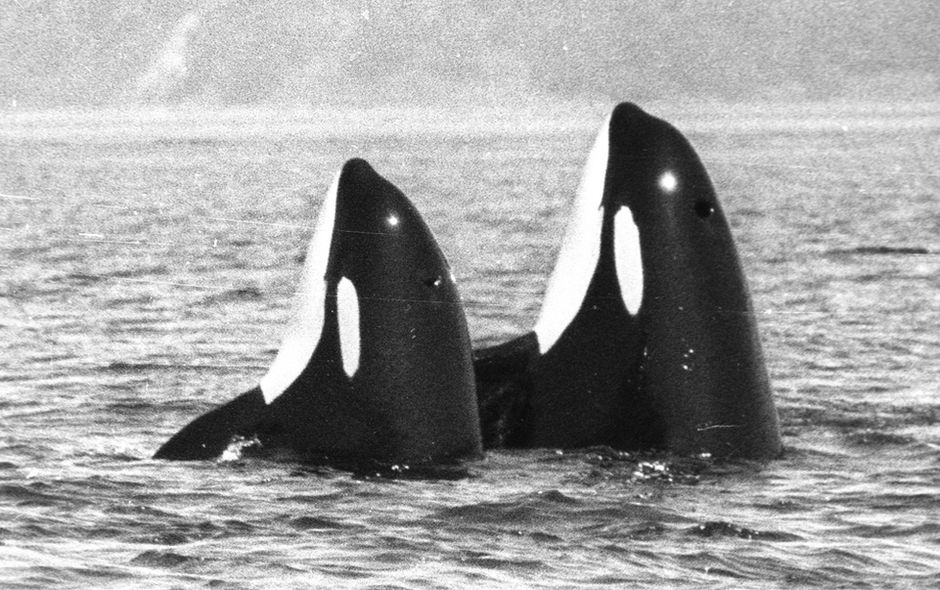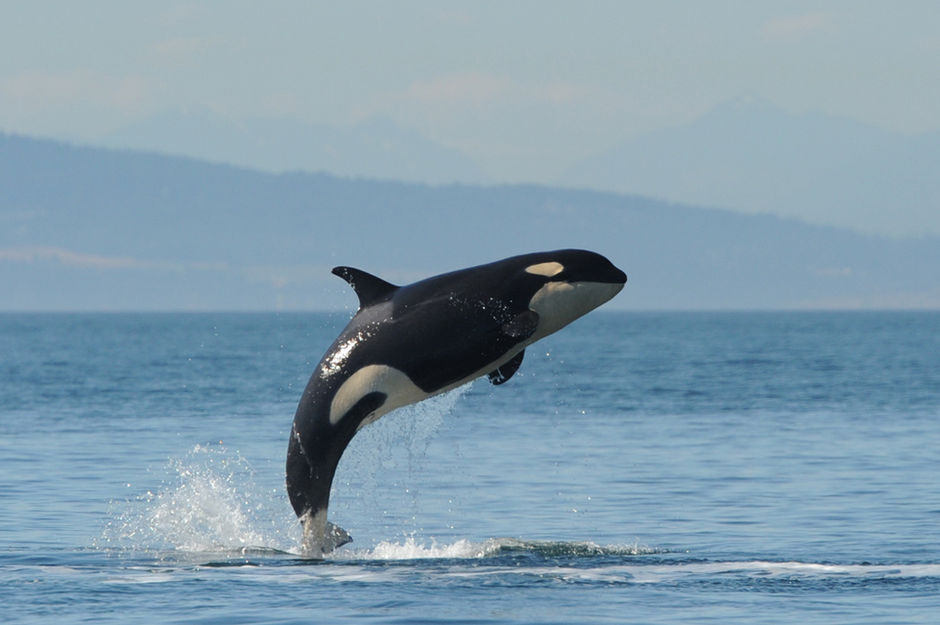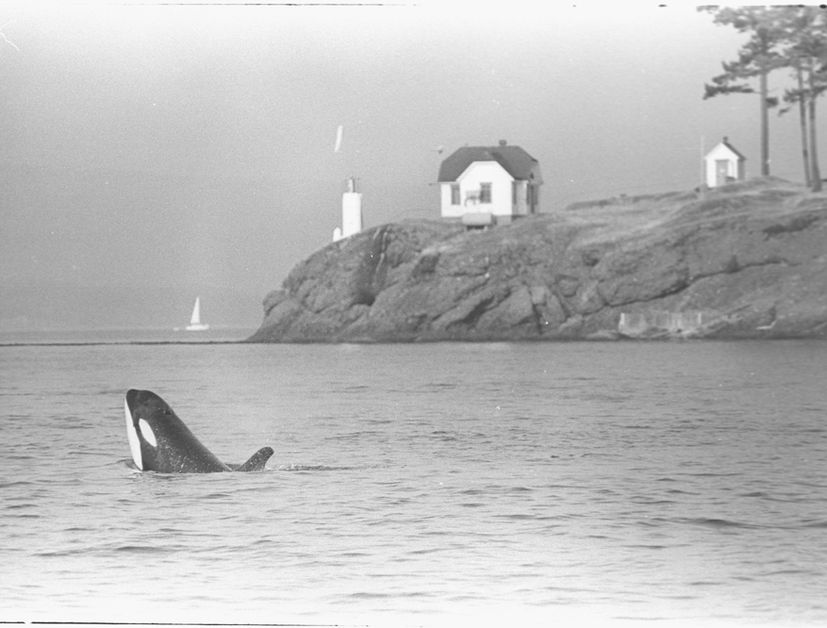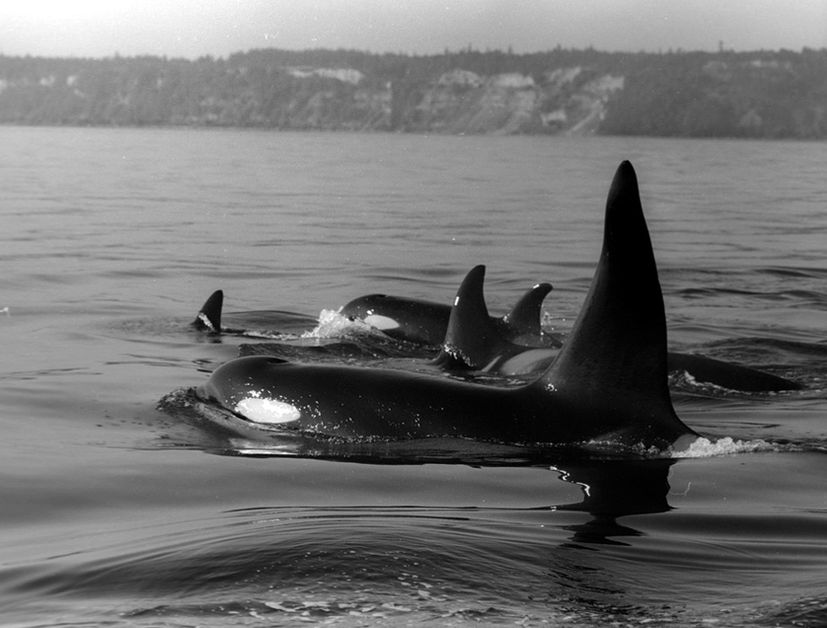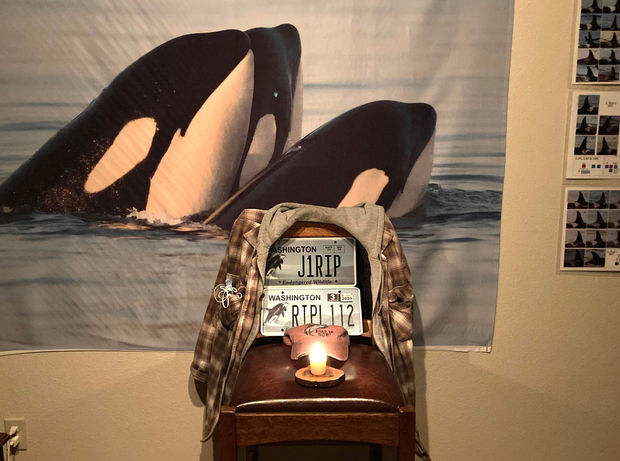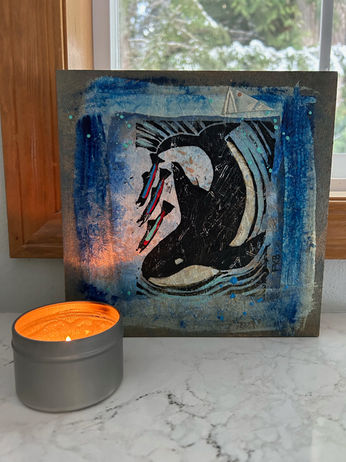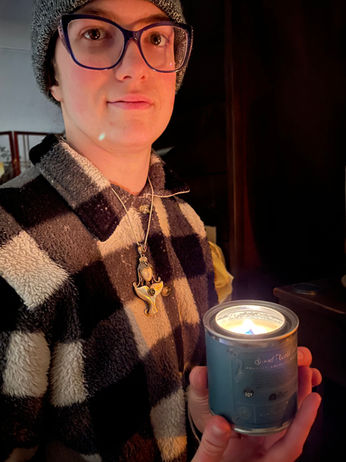the WHALE Report
December // 2022
Special Edition // KEN BALCOMB REMEMBERED

A life dedicated to a cause
1940 - 2022
Kenneth C. Balcomb III
On December 15, the Center for Whale Research (CWR) lost its beloved founder and longtime leader Kenneth C. Balcomb III. Thank you, Ken, for your lifetime dedication to orca science, education, and conservation. We will carry you in our hearts forever.
Ken’s wishes for CWR’s future
It is my vision that [the Center for Whale Research] should have a three-prong approach to the future:
1. [RESEARCH] - Continue our landmark studies of cetaceans in the Salish Sea, particularly of the ecotypes of killer whales that come into this area;
2. [EDUCATION] - Provide public education about these cetaceans and our findings; and
3. [CONSERVATION] - Invest in the conservation of habitats and ecosystems that are ultimately vital to the survival of the cetaceans in the sea. We do not have time to waste in continuing these efforts. The research is well recognized worldwide and will continue to be our mainstay. The educational efforts will continue to engage the public in the reasons and findings of the research. And the Balcomb Big Salmon Ranch will be a giant step toward conserving habitats and ecosystems essential to us all, whales and people alike.
— Ken Balcomb, May 2022 —
Ken Balcomb remembered
All photographs, videos, and information on WhaleResearch.com are Copyright © 2022 Center for Whale Research.

“Even if I had to live on roadkill, I was going to study whales.”
For five decades, Ken Balcomb and the Center for Whale Research team have committed themselves to the best interests of the Southern Resident and Bigg’s/Transient orcas of the Pacific Northwest.

Ken Balcomb remembered
ORCA SURVEY
THE REASON FOR ORCA SURVEY
From the late 1960s through the mid-70s, killer whales (orcas) were captured and displayed in marine parks. A botched attempt to kill an orca for use as a sculpture model led to the “discovery” that they were most often docile, intelligent, and capable of learning. The common perception was that there were thousands [of orcas] . . . the Canadian government decided it was prudent to determine how many killer whales there were in this part of the world. In 1976, ORCA SURVEY was launched as a census to determine the status of the newly defined population of Southern Resident killer whales (SRKW) in U.S. Pacific Northwest waters.
This 13-minute video of Encounter #1 (April 8, 1976) is narrated by Ken Balcomb, reading from his handwritten logbook entry.
FIRST ENCOUNTER WITH J POD
CWR’s first encounter with J pod was on April 16, 1976.
Ken Balcomb recorded this monumental occasion in his logbook of the day. Read his complete handwritten account of the Center for Whale Research’s FIRST ENCOUNTER with J pod.
All photographs, videos, and information on whalesearch.com are Copyright © 2022 Center for Whale Research.

“The governor’s heart is in the right place, and the words are maybe going to follow. But the whales have to eat fish, not words, so it’s time to hit the road and do it.”
Ken was a skilled user of words. A constant source of profound messages. We have included a few of his most memorable quotes below.
QUOTES
Ken Balcomb remembered
“It doesn’t matter how much you talk. They can’t live on words, they live on salmon.”

“No fish, No Blackfish.”
[No Chinook, No Southern Resident orcas].
“I’m not going to count them to zero, at least not quietly.”
“Even if I had to live on roadkill, I was going to study whales.”
“There is no more important issue facing the future survival of J, K, and L pods than ensuring that they have enough salmon to survive and reproduce. Restoration of the Snake River system to normative flow is essential for this to happen on a scale that is meaningful for the salmon and the whales and for the fishermen.”
“We’re at a point in history where we need to wake-up to what we have to consider:
DO WE WANT WHALES OR NOT?”
“This river had the biggest salmon in the Pacific Northwest; they were up to 125 pounds . . . they fed a food chain, and the whales were part of it. So, now that the dams have been removed, the [Elwha] river is starting to come back, and we want to celebrate it. And let the world know that this is how to do it: RECOVER THE ECOSYSTEM.”
“We bought [BIG SALMON Ranch] for the whales.”
“These whales, they’re not doing very well right now, but they’re still here, and they’re going from here to California to Alaska to wherever they have to go to find enough food to eat. [Fighting to remove the dams] is probably the most important project that I’ve undertaken in my life. There’s a lot of opposition, but we’ll prevail.”
“Maybe this is her protest.”
[Ken Balcomb talking about J35 carrying her deceased calf around the Salish Sea for seventeen days in 2020]
All photographs, videos, and information on whalesearch.com are Copyright © 2022 Center for Whale Research.

“They are the charismatic megafauna of the marine environment around here. They absolutely captivate you to watch them. You’re in the presence of something that’s obviously bigger than you and maybe spiritually beyond us, too – socially, they are. They’re pretty awesome.”
The following is a collection of photographs and videos of Ken during his adult lifetime of studying whales. If you have a picture of Ken that you would like to share, please send it to us.
Ken Balcomb remembered
GALLERIES
All photographs and videos Copyright © 2022 Center for Whale Research.
Hard at work and play
Some of Ken’s orca photographs
Ken Balcomb was an accomplished wildlife photographer. We have included some of his favorite orca shots from five decades on the water with whales.
Videos featuring Ken Balcomb
Watch more videos featuring Ken Balcomb on CWR’s YouTube channel videos.

In an interview with Peterson/Hawley Productions, Ken speaks about the importance of removing the Lower Snake River Dams to provide sufficient wild Chinook salmon to feed the Southern Resident orca community. “This is probably the most important project I have undertaken in my life. There is a lot of opposition [to breaching the dams], but we will prevail.”
In this interview, Ken Balcomb talked about the Chinook salmon issues facing the Southern Resident orcas.
In this video, Ken Balcomb talks about the beginning of orca photo-identification and the importance of continuing the ORCA SURVEY and other killer whale research. Watch more videos featuring Ken on CWR’s YouTube channel videos.
All photographs, videos, and information on whalesearch.com are Copyright © 2022 Center for Whale Research.

“What would it take to save these whales? A complete change in our paradigm about how we manage fisheries, how we deal with ecology and ecosystems. There’s still something alive here, but we’re failing it. It’s going downhill while everyone’s having meetings and conference calls.”
Below is a slideshow of photographs from the December 22 candlelight vigil.
Ken touched people all over the world. As of the circulation of the WHALE Report, we have received more than 1,000 comments on our Memory Board, social media pages, and via email. The news of his death has reached millions. Below are a few photographs from the candlelight vigil on December 21, 2022, some of the Memory Board messages, and international media coverage.
Ken Balcomb remembered
IN MEMORY
Messages from the Memory Board
I'm thinking of you not just with sadness at the end of your remarkable life, but with great admiration and gratitude for your extraordinary courage, integrity, humor, and your passion for whales and the oceans — and for all the opportunities I've had to work with you over the last 23 years. You've had a huge positive impact on our ability to shine a light on ocean noise — through litigation, administrative advocacy, activism, film, public presentations, and media. You held your ground and spoke the truth under intense pressure to stay silent — from friends and colleagues in the Navy and NMFS. You've been an icon to my children and even employed one of them — Mia — to work with you on San Juan Island. Through thick and thin, you've found a way to be the best friend to orcas and to beaked whales, sometimes at enormous personal sacrifice and under great duress from ONR and NMFS.
Of course you were the star of the book that won Josh the PEN Prize and the film that brought Michael and me an Emmy. And I will never forget how we all suffered together through so many months of federal advisory council meetings on marine mammals and sound — not the most successful process I've ever been part of.
Personally I'm grateful in particular for the visit with you and Josh at your home on Haro Strait that Josh described in the final chapter of [WAR OF THE WHALES] — when he did all the cooking while you and I drank the scotch. I could go on .... Thanks Ken for all you've done. We will never forget it or you — or the animals you fought so hard to protect.
With sadness and great affection,
Joel Reynolds
Words cannot express — Ken had such a profound impact across many decades to raise public awareness, understanding, and the deepest appreciation of the Southern Resident orcas — and on efforts to protect them, their foods, and their habitats. He was a great scientist and an effective, committed, tireless advocate. Ken reached and affected countless numbers of people — and the need for his conservation work and advocacy, of course, is as urgent as ever. It is up to those of us who remain to carry forward his legacy on behalf of the orcas, the salmon and Pacific Northwest lands, waters and people. RIP Ken.
JB
I had the honor to sail with Ken to Greenland during the summer of 1983. I don't think I have to tell most of you on this thread that it was a pivotal experience in my early education/career. Happy to have kept in touch with Ken off and on over the years. Let us all keep the battle that he took on so many years ago!
You made so many of us better advocates. And we are better for having known you. You will be so missed by your human friends and family and by the orca who you loved so much and dedicated your life to. You are already missed and we mourn your passing.
Haze Sommer
The world needs people like you. Thanks for your work
Anonymous
My sincere condolences to the family of Ken Balcomb.
Ken was instrumental in the science of orcas, helping us all understand what Indigenous people have long known — these whales are members of our families.
Twenty years ago, my father was lucky enough to meet Ken via common friends. Ken instilled in him an awe and love of Pacific orcas. I inherited this love.
We will miss Ken, as will his cousins in J, K and L pods.
May his work continue to inspire us all to fight for their recovery.
Jay Ritchlin, Director General, Nature and Western Region, David Suzuki Foundation
Like so many others, Ralph and I are deeply saddened by the loss of Ken Balcomb, a true environmental hero who has done so much to help our Southern Resident orca pods and other marine mammals. We first met Ken in March 1976, during the SeaWorld capture of six orcas in the Olympia harbor, which we witnessed by chance while out sailing with friends. It was a shocking and horrible scene, during which they had chased the orcas down Puget Sound from Tacoma by throwing seal bombs, buzzing the orcas from above with a sea plane and herding them with a motor boat to get them to a shallow bay where the men could set the nets.
Ironically, Ken and other orca researchers, along with students, were attending an Orca Symposium at The Evergreen State College in Olympia that week. The capture generated widespread concern and protests, and members of the press covered the story extensively. Ken and others from the Symposium spent many hours talking with reporters on the shore near where the orcas were in the nets, crying out for their family members. Through these interviews Ken was able to help people obtain new knowledge of the animals known as "killer whales" and feared as ferocious predators.
Ralph was a member of Governor Dan Evans' staff at that time and he persuaded the Governor and Attorney General Slade Gorton to intervene on behalf of the orcas. The successful outcome of the court trial, mandating release of the captives and stipulating that SeaWorld would never again capture orcas in Washington waters, was accompanied by a greater understanding of orcas by the general public, thanks largely to Ken and others from the Symposium. A detailed description of the events during this capture are found in various publications including books by Sandra Pollard, "Puget Sound Orcas for Sale" and Jason Colby, "Orca: How We Came to Know and Love the Ocean's Greatest Predator."
Following those days in 1976, we worked on several projects with Ken and developed close friendships with him. Ralph was able to connect him with various representatives of state and federal government, as well as Navy personnel. We also had some incredible trips on the water with Ken, where the orcas seemed to know his boat and would stay near us for long periods of time. We both have watched and tried to help the Center for Whale Research and Orca Network as they grew and expanded their reach, and we still follow their activities online.
We send our sincere condolences to Ken's family, and we join the thousands of people who have been inspired and enriched through knowing and learning from Ken Balcomb about the magnificent Orcinus orca species. We think naming the Southern Residents "Balcomb's orca" is a great idea!
Ralph Munro (Olympia) and Karen Munro Ellick (Crofton, Maryland)
Ken was a mentor to me. He taught me that when you have a passion as he did for Whales, you protect what you love and you speak out when you see the ills of the world. What a loss to all of us, to the whales, and to science. Ken, I shall cry a bit tonight and light a candle for you, but knowing that you made such a huge difference with your research and your love for whales and their protection. What you have accomplished is global, You were the 'voice' of justice for all cetaceans.
With deep admiration and fondness, Lynda Green
The whales have lost their greatest friend. Ken will be missed beyond measure. What a mark he left. Everyone wants to change the world, Ken did just that.
Anonymous
Ken you were a quiet force for nature, and always wanted what was best for the whales. You leave a big void we must all work hard to fill. And we will. Thanks Ken, for everything.
Anonymous
It's been a hard couple of days getting used to the fact that Ken is no longer among us, a LOT of people already miss him, family, friends and even those whose lives he only briefly touched.
I became aware of his work in 1994 on an Earthwatch expedition, although it was three years before I actually met him. When we did meet it was so easy to become friends, sharing the love of the SRKW and the Salish Sea area. His Center for Whale Research attracted hundreds of kindred spirits and time spent there over the years since enriched my life.
I feel so fortunate that I was able to visit once again this summer and although Ken was only at the Center for a couple of days it was a highlight of my visit.
I feel blessed that I could call him my friend and he often (only half) joked that the Center as my 2nd home.
Ceud mile taing Ken for all you did to bring the plight of “your” whales to the world.
His passion for the SRKW was truly infectious and will live forever with the ongoing work of the cohort of the people he inspired.
My heartfelt condolences go to his family, work colleagues, friends and acquaintances who are mourning his passing.
Stewart Macintyre — Scotland
The world has lost a bright light, the Orcas have lost an advocate and I have lost a dear friend. I met Ken in 1994 and since then, was privileged and lucky enough to be a staff volunteer with Orca Survey. His research and knowledge of the SRKW population is unparalleled. He was tireless in fighting for them and inspirational in sharing his wisdom. I was honored and delighted to be his friend.
Kathy Babiak
Ken would not ask for any kind of shrine or prayers for him, but this modest arrangement helps us express the sadness and offer some semblance of the person Ken will always be in our hearts. His photo of the triple spyhop showing the orcas' graceful elegance — the ID guides that are the foundation of the research he directed and accomplished since 1976 that continue to reveal the orcas' complex lives — the license plates that spoke of the grief Ken carried — the Breach 'Em NOW! hat speaking for salmon habitat restoration, that he wore everywhere — and the flannel hoodie he wore every day, showing it's not what's in fashion, it's what's in your heart that matters.
For Ken facts mattered. The evidence he gathered and relied upon were the truth behind his dedication to make life better for the orcas, and all marine life, and the whole natural world. He spoke humbly but with every ounce of his being to all of us to learn from science, be bold with our understandings, and speak clearly on behalf of the web of life that sustains us all.
Howie Garrett
In 2018 I was on a sea kayaking trip near Stuart Island when J Pod swam right through our group. In the middle of this magical experience, we saw a CWR boat motor past, keeping up with the orcas. A bearded man on the boat waved at us, and our guide said "That's Ken Balcomb, the great orca researcher."
After that trip, I learned about Ken's work and became a supporter of CWR. I'm so glad Ken was able to see some signs of hope and progress toward the end of his life - orca captivity ended, the Elwha River restored, the Snake River dam removals approved, the Big Salmon Ranch. There is much work for us still to do, but he led the way.
Anonymous
Ken, you were such a huge inspiration to me and had such a compassionate spirit. I will never forget you taking the time to sit down and have lunch with me in Comox when I first met you at Rhapsody's necropsy. I know you touched many lives through your years of dedication to protecting our oceans. Your work will be carried on by us all.
Marcie Callewaert
One of the most generous researchers I have ever had the privilege of speaking with. He will be missed beyond words.
Anonymous
Extensive Media Coverage
News coverage of Ken Balcomb’s death reached far and wide. The following is a small sample:





























